It’s been almost 10 years since America first welcomed Ron Burgundy into its multiplexes and living rooms, and in that time, the anchorman with the big news and perfect hair has truly become a legend. The first film’s manic goofiness brightened many a drunken late-night dorm room, or otherwise awkward family Thanksgiving, it’s best one-liners recited like prayers, chanted like mantras, frat boys shouting along with their mustachioed God: “I’M IN A GLASS CASE OF EMOTION!”
But we’ve all seen how Hollywood can punish a built-in fan base, by which I mean we’ve all seen The Hangover 2. And so the question on the tip of every San Dee-Ah-Gun’s tongue is: Will Ron Burgundy stay classy?
The Short Answer
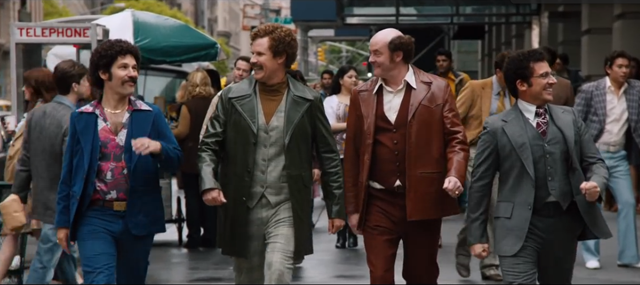
Yes.
The Slightly Less Short Answer
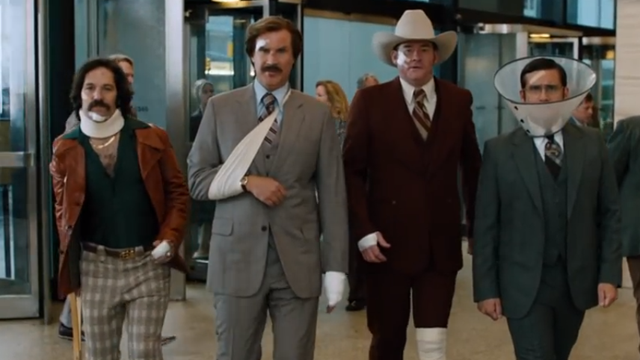
Screenshot via official trailer
Anchorman 2 lacks only the original’s element of surprise. In 2013, Ferrel-Mckay’s frenetic, improvisational style of comedy is no longer a revelation. But in all other aspects, Anchorman 2 satisfies. It provides all the fun of the original: Cleverly bizarre one-liners, comic sequences that extend past idiocy into the sublime, Steve Carrell shouting non-sequitors in a terrified voice. And the sequel even throws in a dash of satire, devoting about 5% of its running time to a broad, but earnest protest against the soul-shrinking frivolity of 24 hour news.
The Story
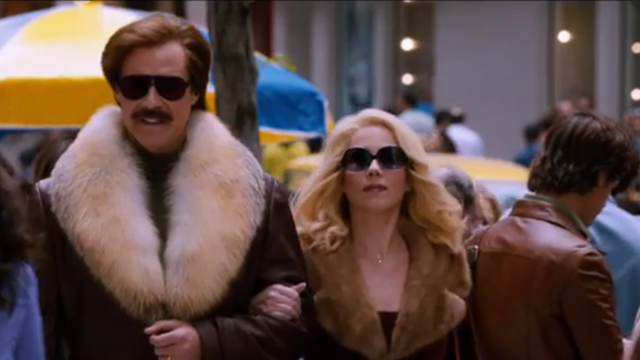
Screenshot via official trailer
Anchorman 2 opens in New York City, in 1980, where Ron Burgundy (Will Ferrel) and his wife (Christina Applegate) Veronica are working as weekend co-anchors on national network news. When the station’s lead anchor, Mack Tannen, announces that he’s going to retire, Ron and Veronica both believe they’re about to be promoted into prime-time. Veronica is right. Ron is fired.
Ron Burgundy has never been great at dealing with failure, or female empowerment. But seeing his wife rise into his dream job, after his journalistic idol calls him the worst anchorman he’s ever seen, brings Ron to total mental collapse. He tells Veronica it’s either him or the job, and quickly finds himself divorced, holding a microphone in one hand, a tumbler of scotch in the other, tearfully announcing the names of dolphins at sea-world.
But six-months later Ron returns to the Big Apple, having re-assembled his old news-team to join a groundbreaking new venture: GNN: The world’s first 24-hour news channel. The boys are stuck working the 2 to 5am graveyard shift…until Burgundy has a flash of insight, asking his producer: “Why do we have to tell the people what they need to hear? Why don’t we tell them what they want to hear?” Soon, Burgundy, and his team: Champ Kind (David Koechner), Brian Fantana (Paul Rudd), and Brick Tamland (Steve Carrel), are getting record ratings, with stories about low-speed car chases, fictional natural disasters, and constant reassurances that America is the best country on the face of the Earth.
What Works
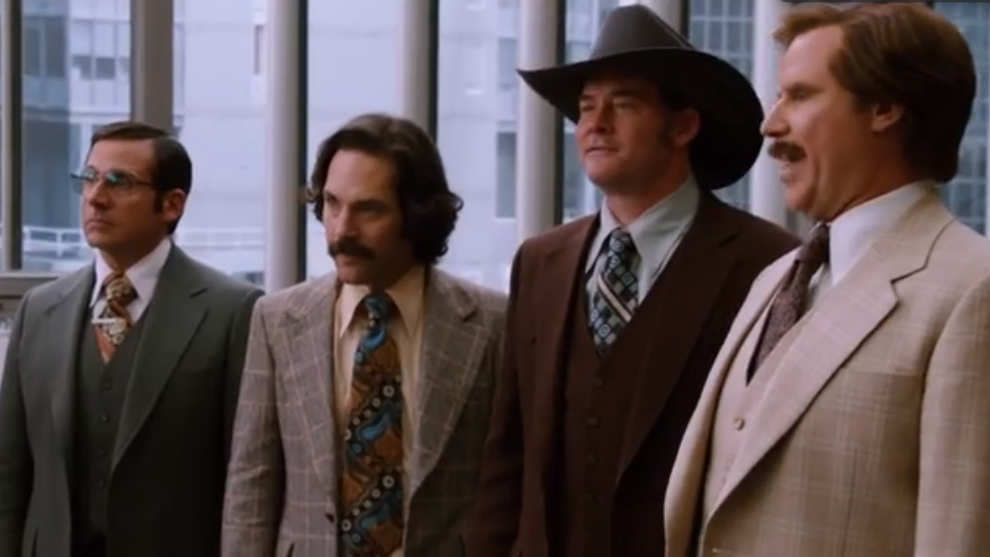
There are a few qualities that distinguish the Anchorman franchise from lesser Hollywood comedies. Chief among them is, of course, Will Ferrell. Ferrell is a preternaturally funny human being. If you look at his DNA under a microscope, I’m confident you’ll find punch-lines printed on its strands. Besides the humor inherent in his 6’3’’, 200 pound frame, Ferrell also happens to be a transcendent improviser. If nothing else, the Ferrell/Mckay films consistently succeed as Will Ferrell random speech generators. One of the chief pleasures of the first Anchorman was listening to Ferrell spout surprising new phrases every couple of minutes, expressing his wonder by shouting, “By the beard of Zeus,” warming his vocal muscles by chanting “The arsonist has oddly-shaped feet.”
Ferrell is not just a funny performer, he’s also a uniquely warm one. Anchorman 2 treads pretty cynical waters, mining its laughs from the entitled ignorance of white male privilege, the craven greed of media moguls, and the most dimwitted, self-congratulatory impulses of the American public. In different hands, the film might have felt mean-spirited. But Ferrell and Mckay keep the satire farcical and forgiving. By the end, the tone struck by Anchorman 2 isn’t much different than that of Ferrell’s now classic Christmas film Elf. This is because, like “Buddy” from Elf, all Anchorman 2’s characters are essentially children . However, selfish and cruel they may be, they are redeemed by their naivety and helplessness.
Burgundy’s chief rival in the film is Jack Lyme, an impeccably handsome and charismatic primetime anchor at GNN, played with relish by James Marsden.
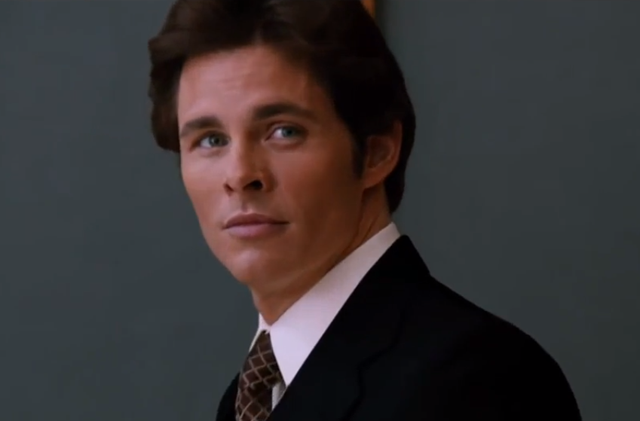
Screenshot via Official trailer
The feud between the two starts when Burgundy stares too long at Lyme’s beautiful face, the first time they meet at GNN. Lyme taunts Burgundy in a pre-adolescent tone that transforms the GNN headquarters into a school cafeteria. Lyme is an egotistical sociopath, but Marsden plays him with all the barely suppressed vulnerability of eighth-grade bullies everywhere.
Rudd, Carrell, and Koechner each add their finely crafted comic personas to the mix. The playful energy of their improvised scenes together is contagious. Carrell’s star has risen considerably since 2004, and the writers give his sweet but demented weatherman his own subplot, with a love interest and everything. The romance between Brick Tamland and Chani, a similarly mentally ill receptionist played Kristen Wiig, is likely to be one of the more polarizing parts of the film. The couple spends most of their screen time huddled around a Laundromat soda machine, whispering sweet non-sequiturs to each other.
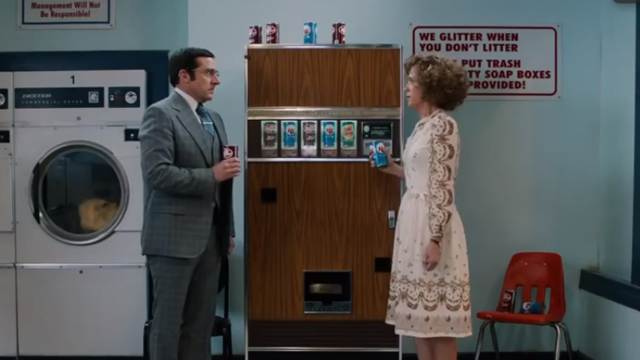
Screenshot via official trailer
Some audience members might find such scenes overly odd or self-indulgent, but I enjoyed listening to Carrell and Wiig try to out-bizarre each other, offering such flirtatious brags as: “I can always guess how many jelly beans are in a jelly bean jar, even when I’m wrong.”
Meagan Good turns in a fine performance as Ron Burgundy’s new “African and American,” boss turned lover, a character that provides Ferrell plenty of opportunities to magically restore vitality to the very old joke of a white guy trying to relate to black people in the most offensive of manners.
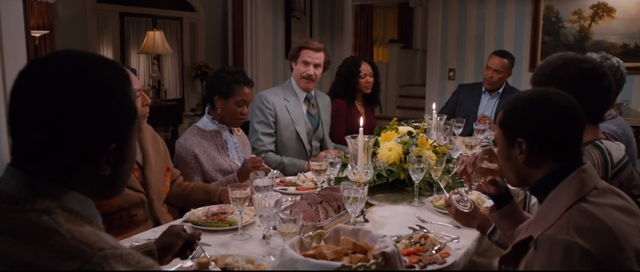
Screenshot via official trailer
While a lot of the movie’s structure mirrors that of the original, the film takes a wholly surprising third-act detour that proves to be the most satisfying section of the film. I don’t want to give anything away but, suffice to say, it involves an abandoned lighthouse, a wounded shark, amateur painting, and seeing the world in a whole new way.
Finally, the film does make room for a few clumsy but pertinent critiques of the kind of sensationalist, frivolous news-making that we at Heavy would never ever traffic in. Ron Burgundy is able to beat his ex-wife turned primetime rival’s interview with Yassar Arafat by airing footage of a random local car chase and speculating wildly about what drugs the driver might be on.
There’s also a half-baked subplot about corporate interests threatening the objectivity of GNN’s reporting, and at one point the filmmakers allow Ron Burgundy to say “News is supposed to keep watch over the powerful so the powerful don’t become corrupt. But what happens when the powerful own the news?” The political critique is a bit pasted-in, but that the film asks its audience to contemplate these issues at all is admirable. It’s quite rare for a Hollywood comedy to clumsily place political advocacy into its narrative, rather than consumer products.
What Doesn’t Work
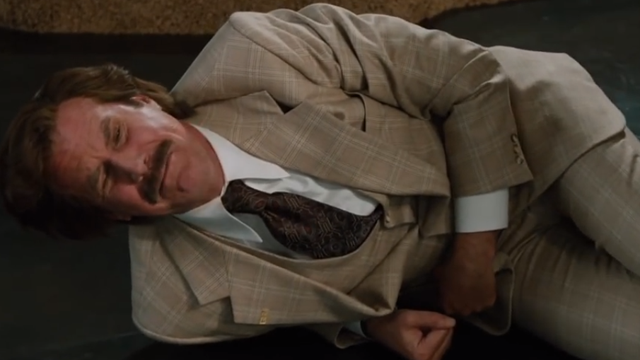
Screenshot via official trailer
It is a bit difficult to justify the movie’s 119 minute running time. I was never bored, but there are moments in the final stretch that feel like a really great band taking one too many encores.
This kind of comedy isn’t for everyone. The characters are not well-rounded or nuanced. There’s a plot, but only when the writers remember to have one. All other elements of film and narrative are subservient to the joke. Not every joke hits, but there are roughly 75 per minute.
If you hated the first Anchorman, barring a significant change in your personality over the last decade, don’t spend $15 to see the sequel.
Final Thought
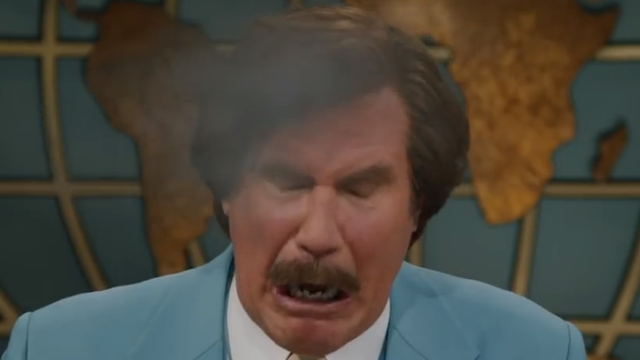
Screenshot via official trailer
Anchorman 2 imagines that the pathologies of corporate-owned, 24-hour cable news began in 1980, with Ron Burgundy asking why he couldn’t give the people what they wanted, instead of what they needed.
Anchorman 2 isn’t what we need. It won’t pull the scales from our eyes, making us see that our preference for delusion and distraction over inconvenient truths is self-destructive. It won’t make us demand a more adversarial media, a more responsive and transparent government, or sustainable environment. It won’t inspire us to quit drinking or stop blaming our mothers, or stand up for ourselves at work, or whatever it is we really need to do.
But as the audience cackled and clapped at a parade of celebrity cameos, in a climactic showdown too absurd to describe, it was clear Anchorman 2 had given us exactly what we wanted.
Comments
‘Anchorman 2′ Review: Does Ron Burgundy Stay Classy?